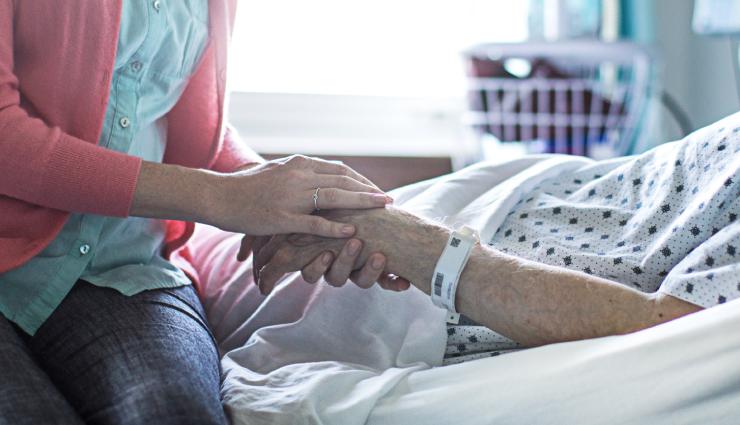In the middle of March 2022, the news was published worldwide, making “euthanasia” a frequent hashtag on social networks. It was reported in this news that the famous French actor Alain Delon plans to end his life through euthanasia. Although Delon’s son denied this news in the following days, many people still questioned what euthanasia was. Is this legal?
What does euthanasia mean?
Euthanasia is originally a Greek term that has two parts:
- The word Eu means good;
- The word euthanasia is synonymous with death.
These words together mean good, easy, painless, and similar concepts.
Sometimes people suffering from painful, incurable diseases or debilitating physical disorders cannot tolerate these conditions. In this situation, their treatment is stopped, or if the person is on artificial respiration, they remove the breathing apparatus.
Types of euthanasia
1. Euthanasia based on the individual’s will
If we consider the role of will in this type of death, the types of euthanasia are:
- Voluntary: A compassionate death for which a person has full consent. This type of death is legal in Australia, Belgium, Canada, Colombia, Luxembourg, the Netherlands, Spain, Switzerland, New Zealand, and some American states such as Washington and New Jersey.
- Involuntary or imposed: in some cases, such as brain death, a person cannot consent due to a particular physical condition. In this situation, one of his relatives or legal guardian decides based on his needs and quality of life.
2. Euthanasia based on its methods
Death due to Pity can also be classified based on its methods. Accordingly, the types of death due to compassion are:
- Active: When lethal substances or methods are used to end a person’s life, it is called active euthanasia.
- Inactive: Refusal of life-giving and necessary treatment is said. In this euthanasia, the patient’s hope is cut off, and no treatment is performed to continue his life.
Actively assisted dying is more controversial. This work faces legal, religious, and moral objections in many countries.
The difference between euthanasia and assisted suicide
Sometimes death due to Pity is mistaken for the suicide of a patient with the help of a doctor. Although these two have similarities, in helping to commit suicide, the doctor only provides the means of suicide to the patient, such as lethal poison. It is the patient who ultimately decides. In fact, in this case, the doctor is a so-called deputy of the crime, not its manager, while in euthanasia, the doctor is allowed to end the patient’s life with a painless means such as injecting a lethal poison.
Death by Pity throughout history
1. Euthanasia in ancient times
One of the opponents’ arguments for mercy death goes back to the Hippocratic Oath 2,500 years ago. Today, all doctors take the Hippocratic Oath before starting their practice. The text of this affidavit states:
I will not give lethal medicine to anyone who asks for it, nor will I suggest it.
However, supporters of euthanasia believe that traces of the moral legitimacy of this work can be seen in the thought of people like Plato, and it is old enough.
2. The state of death by Pity in the 18th and 19th centuries
The issue of legalization or not of euthanasia was raised in the legal circles of the world from the early 1800s onwards. In 1828, the first law against euthanasia was passed in New York. Over time, other states followed this law.
However, other things were going on in England. In 1935, a movement was formed in this country whose goal was to legalize euthanasia. This movement was led by a person named “C. Killick Millard,” which led to the establishment of the “Association for the Legalization of Voluntary Euthanasia” or the Euthanasia Association. The proposed bill of this association was presented and rejected in the British House of Lords in 1936 and 1950. In 1938, an association with the same name was formed in the United States of America.
3. The fate of euthanasia law in the 20th century
The Netherlands in 2001 and Belgium in 2002 were the first countries to agree to euthanasia in the 20th century. Although the first euthanasia law was approved in 1995 in the northern region of Australia, the Dutch judicial system implemented this law earlier than the Australians.
In 2009, the Supreme Court of South Korea recognized the “right to die with dignity” in a case ruling. In this case, the family of a brain-dead woman requested that her breathing apparatus be turned off.
What do supporters of merciful death say?

In general, those who agree with euthanasia give these reasons:
- Freedom of choice: Advocates of euthanasia legalization believe that people should be able to make decisions about their own lives.
- Quality of life: only the person knows how he feels about being alive. Accordingly, those in favor of death with compassion say that each person can decide for themselves the impact of physical and mental pain caused by prolonged illness and death on their quality of life.
- Self-respect: Advocates of euthanasia believe that every person should die with dignity, and this method contributes to a dignified death.
- Those around the patient: Many who witness the gradual death of patients believe euthanasia should be allowed. According to this group, this type of death reduces the pain and suffering of the patient and his loved ones.
- Using resources and facilities for other patients: Compassionate death advocates say this frees up hospital resources, equipment, hospital beds, and drugs for life-saving treatments for those who wish to live.
What is the argument of the opponents of euthanasia?
1. The role of the doctor
The Hippocratic Oath is the first reason for this category. According to the opponents of euthanasia, doctors probably do not want to question their professional role in treating patients and the Oath they took at the beginning of their work.
2. Religious and moral teachings
According to religious education, euthanasia is murder in different religions. Christians and Jews refer to the ten commandments of the Torah, and Muslims consider this type of death forbidden according to their holy book.
From a moral point of view, euthanasia ultimately causes society to disrespect the sanctity of life.
3. Legal capacity of the patient
Some say euthanasia is voluntary only if the patient is mentally competent to decide. He must understand the options and consequences before him properly and can express this diagnosis and the desire to end his life. According to the opponents of merciful death, it is not easy to determine the patient’s legal capacity.
4. Unnecessary guilt
Opponents of euthanasia say that patients may feel unnecessarily guilty and feel that resources are being wasted on them. They are so psychologically stressed that they finally consent to death. Opponents of this type of death believe that the hospital staff may encourage patients to consent with financial incentives.
5. a mental disorder
Those who suffer from mental illnesses such as depression are likely to seek help for suicide. These conditions can make decision-making more complicated.
6. Worrying about the prevalence of this method
Opponents say this method may be implemented on terminally ill patients first, but later the rest will also resort to this method. As a result, this type of death by suicide is becoming more common.
7. The probability of the patient’s recovery
Some opponents believe that medical science has sometimes witnessed miracles and cases of incurable patient recovery. Consequently, euthanasia is not suitable even for those with no hope of life.
Euthanasia in Iran
The laws and regulations of our country, especially the penal law, have been compiled based on Islamic standards. In Islamic teachings, suicide and murder are forbidden in general. Therefore, even though euthanasia is not explicitly criminalized in any country’s laws, referring to some rules, you can find the related rulings.
Active and voluntary euthanasia are both examples of intentional homicide because, in them, the doctor intends to kill the patient, and what he does is for the same purpose. In this type of euthanasia, even the honorable motive of the doctor cannot prevent him from carrying out his revenge as a justified factor.
Many jurists refer to paragraph A of Article 291 of the Islamic Penal Code, approved in 2013, to express the prohibition of death out of compassion. According to this article:
The crime is considered to be intentional in the following cases:
a. When the perpetrator intends to act against the victim, but does not have the intention of committing a crime or something like it, and it is not one of the cases that fall under the definition of intentional crimes.
According to legal experts, it can be concluded from this article that the ruling also applies to patients who, for any reason, do not have the competence to take care of their situation and whose lives were terminated by active euthanasia.
However, suppose the patient consents to this out of compassion before death, according to Article 365 of the Islamic Penal Code. In that case, the doctor will not be retaliated against, and only the punishment of imprisonment will be implemented. This legal article states:
In the case of murder and other intentional crimes, after the crime and before death, the victim can waive or compromise the right to retribution, and the parents and heirs cannot demand retribution or ransom after his death, as the case may be, but the perpetrator is subject to ta’zir. The provision in the fifth book of “Tazirat” is condemned.
you say
Euthanasia is legal in some countries, such as Switzerland, for terminally ill patients, and in many other countries, such as Iran, it is considered illegal and immoral. The supporters and opponents of this issue each have their reasons. Proponents point to issues such as the freedom of choice of people, and opponents consider it to be against the professional ethics of doctors. What is your opinion?



